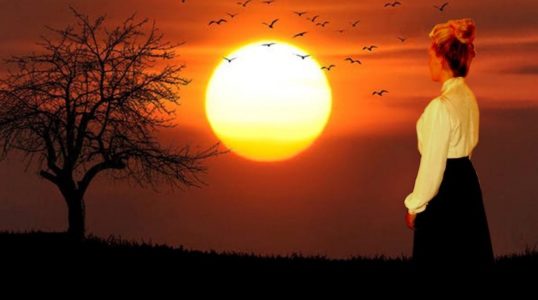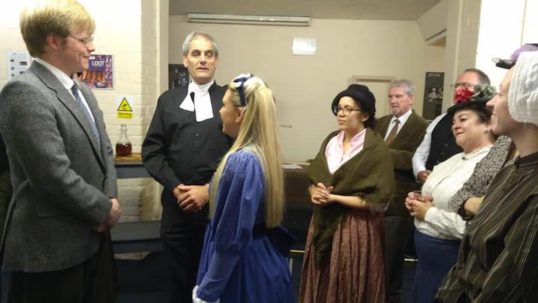Bringing the Mearns to the Stage
New adaptation of Scotland’s favourite book for Leitheatre
The week that marks the centenary of the end of the 1914-18 war seems a most appropriate one for Leitheatre to bring a new adaptation of Lewis Grassic Gibbon’s Sunset Song to the stage.
Theatre productions related to the 1914-18 war have largely focussed on the experience of soldiers in the conflict. Sunset Song, playing the Church Hill Theatre from Wednesday 14 to Saturday 17 November, provides a framework for their sacrifice, putting it slap in the middle of the demise of a whole way of rural life.

Leitheatre is staging a new adaptation of Sunset Song at the Church Hill Theatre, Wed 14 – Sat 17 November 2018.
Urban Scotland in 1914 was getting on with its progress – the footballers who signed up to MacRae’s Battalion in A War of Two Halves got the call in a mass rally in the then recently built Usher Hall, and the fans who joined up worked in factories around the capital.
But rural Scotland was still heavily dependent on intense physical, manual labour. The ways of crofting and peasant farming had changed little from the time of Robert Burns, farming in Ayrshire just over a century before.
The 1914-18 war, described with devastating effect in Oh! What A Lovely War and The Last Days of Mankind, needed able young men to fuel it. Their call-up from the rural communities changed that rural landscape.
As in the city, women took on the roles men had previously had. But the sheer lack of bodies heralded the arrival of machines and new ways of farming which changed, forever, the makeup of the farming communities the returning soldiers came back to.
modernisation
It is against this background that Gibbons sets his story of young Chris Guthrie. Her personal journey through adversity, her growth from a dutiful farmer’s daughter into a strong-minded farmer, wife, mother and ultimately war widow, is paralleled by the destruction of the world of crofters and peasant farmers in the face of 20th-century modernisation – the “Sunset” of the title.
Published in 1932, the novel faded from view after Leslie Mitchell’s early death in 1935 – Lewis Grassic Gibbon was his pen name. It didn’t really come back into prominence until it was serialised on television.
It was on TV that Stephen Hajducki, director of Leitheatre’s production, first became aware of it. And then his cousins bought a holiday cottage in what was then Kincardineshire, in the Howe of the Mearns.
“My cousins were intrigued as to why individuals would often stop and photograph their modest cottage,” he says. “Until they discovered that it had been the childhood home of Grassic Gibbon and the inspiration for Blawearie.”
Apart from Arbuthnott, which Grassic Gibbon renamed Kinraddie, other places such as Drumlithie are real locations, while he based the characters in the book on local people he had known.
“At the time I used to visit, there were still old folk who remembered him,” says Hajducki. “Not always, it must be said, with great affection, because his pen-portraits were very recognisable and rarely flattering, capturing their petty pride, greed and narrow-mindedness as well as chronicling their lives.
“However, time is a great healer, and now his novel is regarded as one of the best portrayals of Scottish rural life.”
An “interesting challenge”
Adapting a 100,000 word novel that spans a whole community over several years into a two-hour stage play is no mean task, but it is one which the adaptor of Leitheatre’s new version, Jonathan North, sees as an “interesting challenge”.
He says it is partly about deciding which minor characters and subplots to leave out, and which vital elements of symbolic significance as the standing stones and the surrounding impact of the war, to leave in.
“There have been earlier stage versions of Sunset Song, but none of them were particularly satisfactory for our purpose.”
One element has been how to treat the narration of the original novel – used effectively on the 1971 TV adaptation, but a form of storytelling which is less effective on the stage, even when there is a lot of information.
“I didn’t want to use theatrical clichés such as actors coming out of character to tell the audience what happened next,” he says. “Such artificial constructs destroy the continuity and sense of drama, rendering the production more like a series of lecture notes.”
North’s solution is simply to let the villagers tell the story themselves. And it is a solution which is perfect for a script written for the likes of Leitheatre.
“One benefit of a community theatre group such as Leitheatre, with a large number of members, is that it doesn’t have to resort to actors forced to each play several parts to keep cast numbers down, making it difficult for the actors to develop well-rounded characters, to convey the sense that this is about a community, and is confusing to the audience.
“Instead, there’s a wide range of parts, large and small, to suit all acting abilities, and in rehearsals we are already seeing some excellent performances. Hopefully we’ve struck a balance here between the practicalities of a stage adaptation and keeping the essence of the original.”
That essence has not been without its controversies. Modern readers love the book for its unsentimental and realistic style. Here is a novel that it afraid to look at female empowerment, sex, dysfunctional families or the aftermath of war – and in Guthrie there is possibly the most convincing female character in Scottish fiction written by a man.
But these things were more controversial when the book was first published. So much so, that Aberdeen Public Library considered it ‘unsuitable for general circulation’ and had only one copy which had to be specially requested to view.
Listing
Sunset Song
Church Hill Theatre, 33a Morningside Road, EH10 4DR
Wednesday 14 to Saturday 17 November 2018
Evenings Wed – Fri: 7.30pm; Matinee Sat: 2.30pm.
For tickets: Book here.
The original novel and the 2015 movie adaptation are available from Amazon. Click for details:
ENDS























